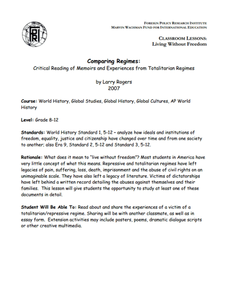Foreign Policy Research Institute
Comparing Regimes: Critical Reading of Memoirs and Experiences from Totalitarian Regimes
Can you imagine living in a totalitarian country? Learners will read several primary source memoirs to gain a deeper understanding of what life is like under a controlled government. They'll discuss each piece in pairs, research...
Khan Academy
Khan Academy: Origins of Rock Art in Africa
Personal ornamentation and engraved designs are the earliest evidence of art in Africa and are inextricably tied up with the development of human cognition. View pictures and read about prehistoric art in Africa.
Khan Academy
Khan Academy: Rock Art in North Africa
Algeria hosts a rich rock art concentration. The most renowned of all these areas is the Tassili n'Ajjer described as "forests of stone". View pictures and read a brief history of rock art in Africa.
Khan Academy
Khan Academy: Portrait of King Mishe Mishyaang Mambul (Kuba Peoples)
The ndop statues might be the most revered of all Kuba art forms. The ndop (literally meaning "statue") are a genre of figurative wood sculpture that portrays important Kuba leaders throughout the eighteenth to twentieth centuries. View...
Khan Academy
Khan Academy: Apollo 11 Stones
The Apollo 11 Stones remain the oldest examples of figurative art from the African continent. Their discovery contributes to our conception of early humanity's creative attempts, before the invention of formal writing, to express their...
Khan Academy
Khan Academy: Owie Kimou, Portrait Mask (Mblo) of Moya Yanso (Baule Peoples)
This article discusses the importance of sculpted masks in West African culture. Learn about the two types of entertainment masks, Goli and Mblo, and their role in masquerades.
Khan Academy
Khan Academy: Power Figure (Kongo Peoples)
Nkisi nkondi figures are highly recognizable through an accumulation of pegs, blades, nails, or other sharp objects inserted into its surface. This Kongo tradition has survived over the centuries and migrated to the Americas and the...








